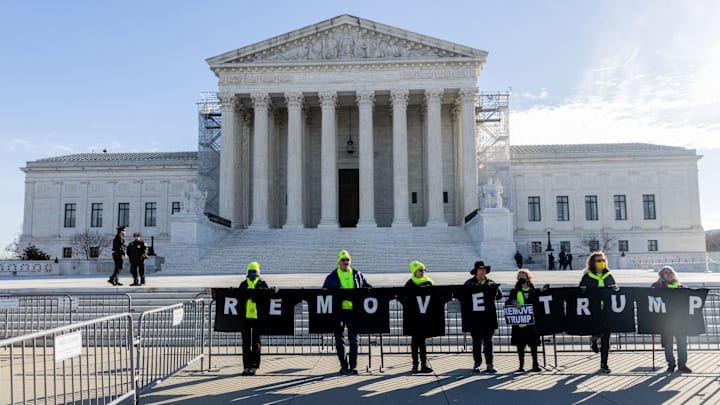
Background on the 14th Amendment
The 14th Amendment was the second in a series of amendments passed after the Civil War. While the 13th officially ended slavery and the 15th expanded voting rights, the 14th Amendment focused on ensuring equal rights for individual citizens.
Some of the major consequences of the 14th Amendment were that states were now beholden to the Bill of Rights (which previously only applied to federal actions), and that anyone born in the country legally had access to all the rights and privileges of citizenship, including reasonable representation.
The amendment was passed by Congress on June 13, 1866, but it was not ratified for another two years. However, it has remained a critical part of the Constitution ever since (excluding a minor portion changed by the 26th Amendment).
The 14th Amendment has 5 sections, most of which refer to the rights that new Black citizens were entitled to or former Confederates were barred from. Below is a brief summary of each section, to give a little more context to the portion being examined in Trump v. Anderson.
- Section 1 grants citizenship to anybody born or naturalized in the country, as well as dictating that states cannot make laws that would infringe on a citizen's rights.
- Section 2 effectively eliminates the Three-Fifths Compromise when determining a state's representation. It also contains a section that states that, if some portion of the population is blocked from voting, the state's representation on the federal level should be adjusted accordingly.
- Section 3 states that nobody can hold an office if, after previously taking an office, they took part in an insurrection or helped an enemy of the country. We'll break down the details of this in the next section.
- Section 4 addresses the financial consequences of the Civil War. It essentially says that the United States is responsible for debts incurred while putting down the rebellion, but it is not responsible for the debts of the rebels. In addition, there is no debt owed because of freeing former slaves.
- Section 5 says that Congress has the right to enforce the previous four sections.

How has Donald Trump's case proceeded?
The case against Donald Trump in Colorado was filed by a group of voters who were eligible to participate in the state's Republican Primary. These individuals were all either registered Republicans or were not affiliated with another party, including the Democrats. This group (hereafter referred to as Anderson et al) requested that Secretary of State Jena Griswold remove Donald Trump from the ballot for the primary.
The case had both federal and state reasonings. The group's lawyers argued that, because of Colorado’s Uniform Election Code of 1992, the Secretary of State has the right to remove unqualified candidates from the ballot. They then argued that Donald Trump should be removed, as he had been disqualified from future office due to his actions on January 6, 2021.
The case was first heard by the Denver district court, where Judge Sarah B. Wallace presided over a five-day trial. In this trial, both sides had the opportunity to argue their position regarding two questions: Is Donald Trump guilty of participating in an insurrection? and Can Donald Trump be removed from the presidential ballot due to Section 3 of the Fourteenth Amendment? The court ruled that Trump did participate in an insurrection, but that he was not beholden to Section 3.
"The Court concludes, based on its findings of fact and the applicable lawWallace, Final Order
detailed above, that Trump incited an insurrection on January 6, 2021 and therefore
“engaged” in insurrection within the meaning of Section Three of the Fourteenth
Amendment."
In the view of the Court, Anderson et al had sufficiently proven that he was a participant in the events of January 6, which fit the provided definitions of an insurrection. However, they also found Trump's team's examination of the language of Section 3 to be valid, based on the "office/officer" claim (explained in detail on slide 5).
Based on this, the Court ordered the Colorado Secretary of State to put Donald Trump on the ballot. However, Anderson et al escalated the case to the Colorado Supreme Court, which found in a 4-3 opinion that Trump did participate in the insurrection and that Section 3 applied to him.
"President Trump asks us to hold that Section Three disqualifies every oathbreaking insurrectionist except the most powerful one and that it bars oath-breakersColorado Supreme Court, Opinion
from virtually every office, both state and federal, except the highest one in the land.
Both results are inconsistent with the plain language and history of Section Three."
However, this decision was made pending the opportunity for it to be forwarded to the United States Supreme Court. If the Supreme Court chose to proceed with the case, then Donald Trump would remain on the ballot, pending their decision. The case was chosen to progress on January 5, 2024.
Rather than addressing the issue as a whole, the Supreme Court is only going to respond to the question, "Did the Colorado Supreme Court err in ordering President Trump excluded from the 2024 presidential primary ballot?" They heard arguments on February 8, 2024, and their decision is expected any time before the Colorado primary on March 5.
The case is now entirely in the hands of the Supreme Court Justices. However, it is important to know three key figures in the debate. Jonathan F. Mitchell formally represented Donald Trump during the oral arguments before the Supreme Court, while Jason C. Murray represented Anderson et al. Shannon Stevenson represented Colorado Secretary of State Jena Griswold.
Slide 3 analyzes how Section 3 can be understood, using historical context and textual analysis.
